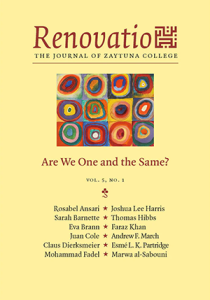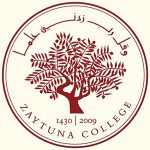Renovatio Journal 8 (Vol.5, No.1 Fall 2021): Are We One and the Same?

Editor-in-Chief: Hamza Yusuf
Publisher: Zaytuna College
Year of Publication: 2021
Print Length: 108 pages
Genre: Islamic Studies / Theology, Ethics and Philosophy; Hadith, Sunnah & Sirah, History, Science, Qur’anic Studies; Non-Fiction / Religious Studies
Topic: Allah ﷻ, Prophet Muhammad ﷺ, Muslim, Islam, Qur’an, Ethics & Morality, Religious Authority, Modernity, Modernism, Modern; Postmodernity, Postmodernism, Postmodern; Religion, Religious Thoughts & Philosophy, Animal Rights, City & Urban, Democracy, Diversity, Egalitarianism, Equality & Inequality, Equity & Fairness, Giving, Language & Literature, Love, Sanctuary, Spirituality
Renovatio (renovatio.zaytuna.edu) is a Muslim journal about the ideas that have shaped our past and present world. We ask scholars, theologians, and writers to examine timeless questions and today’s moral challenges by drawing from the enduring texts of revelatory faith traditions and current thinking from philosophy, theology, and ethics to history, politics, the social sciences, and beyond.
Vol.5 No.1: Are We One and the Same?
Say “Are they equal, those who know and those who do not know?” (Qur’an 39:9)
Renovatio’s Fall 2021 edition focuses on the timely and timeless matter of equality. The pursuit of equality has been pervasive yet remains elusive. Do we have a shared definition of equality, and can we recognize each other’s humanity without imposing upon ourselves conformity? Writers of varied backgrounds and traditions explore the allure—and the shortcomings—of our more compelling constructs of egalitarianism.
Table of Contents
Contributors
1. When Equality is Not Enough – Mohammad Fadel
Equality is indisputably a central Islamic moral value, but preventing domination could be Islam’s most important legal principle.
2. The Human Arts of Graceful Giving and Grateful Receiving – Joshua Lee Harris
Expressing thanks comes from good manners and also accrues future benefits. But is there more to gratitude than attending to politeness and seeking reward?
3. Equal to? – Eva Brann
Equality is a relation, but the most consequential relation in society is that between inequality and liberty.
4. What is the Place of Democracy in Islam? – Andrew F. March
Can—and should—democracy be a deep commitment for religious Muslims?
5. The Egalitarian Objection to Liberal Education – Thomas Hibbs
Far from being elitist and aristocratic, the liberal arts can free the human soul in the pursuit of human flourishing and advance the cause of equality.
6. Why Salvation Means Submission – Sarah Barnette
Jane Eyre, as both domestic romance and bildungsroman, speaks to secular debates of gender, empire, and psyche, but the novel is in fact a deeply pious text.
7.On Divine Love – Faraz Khan
In an age of angst and fury, we would do well to turn to piety rooted in a love of God.
8. “People Are Equal Like the Teeth of A Comb” – Rosabel Ansari
How do we account for a common humanity in a way that does not lead to bare uniformity, whereby we must all be human in the same way?
9. “The Diversity of Your Languages and Complexions” – Juan Cole
Ethnic diversity serves as a sign of God, demonstrating that His ramifying creativity has been at work, and getting to know others enriches and enlarges the self.
10. A City We Can All Belong to – Marwa al-Sabouni
The Factory Syndrome has frayed the social fabric of industrial cities. Can insights about urbanization by the fourteenth-century Muslim polymath Ibn Khaldun help remedy our current crisis of community?
11. Is There Moral Equality between Humans and Animals? – Claus Dierksmeier
Like humans, animals possess rights—but are their rights any weaker than ours?
12. Spirituality in the Postmodern World – Esmé L. K. Partridge
How ought traditional metaphysics grapple with “liquid” spiritualities that revolve not around objectivity but around the individual self, free from all doctrinal restraints?

Zaytuna College was founded in Berkeley, California, with a mission to educate and prepare morally committed professional, intellectual, and spiritual leaders who are grounded in the Islamic scholarly tradition and conversant with the cultural currents and critical ideas shaping modern society, through a traditional liberal arts education.
Source: https://zaytuna.edu/about
More from Zaytuna College in this library, click here.

Hamza Yusuf is president of Zaytuna College in Berkeley, California, the first accredited Muslim liberal arts college in the United States. A leading proponent of classical learning, the traditional liberal arts, and great books education in both the Western and Muslim traditions, he has translated, authored, and coauthored numerous publications, including scholarly books and articles as well as papers on major current areas of ethical concern. He holds traditional advanced degrees (ijazaat) in Islamic law and theology, as well as a BA in Religious Studies (San Jose State University) and a PhD from the Graduate Theological Union in Berkeley, California.
Source: https://sandala.org/pages/about-us
More from Hamza Yusuf in this library, click here.
